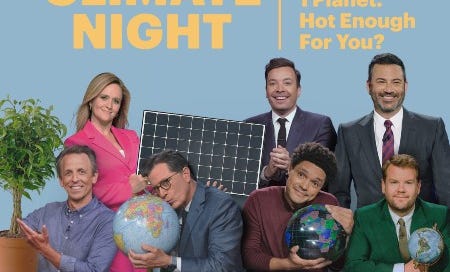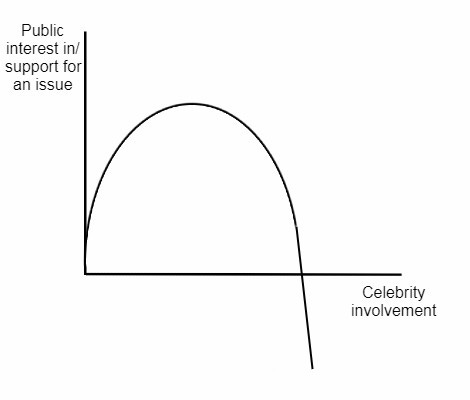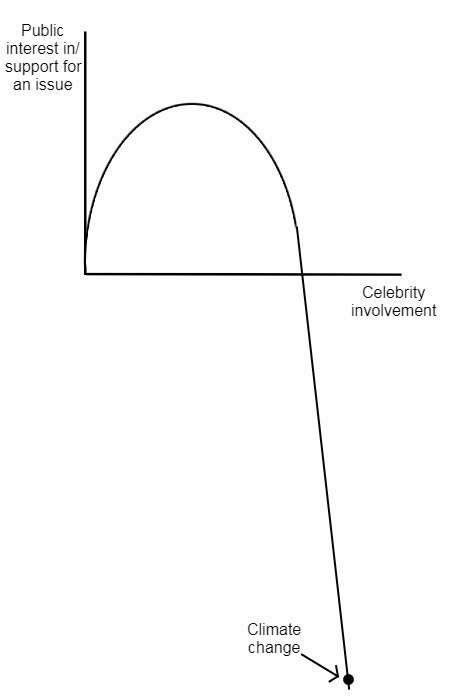I stared at this for a while trying to figure out why it bugged me so much:
Why does this trigger the “fuck you” center of my brain (which, to be fair, is about 60 percent of my brain)? Is it the “Hot Enough For You?” tagline, which implies that decades-old shows doing completely-typical segments is somehow “hot”? Is it Meyers and Bee cheerfully presenting a (photoshopped-in) tree and solar panel, as if to say “have you considered this, you complacent fucks?” That might be it. Without a doubt, Fallon and Kimmel come off best, because they obviously said “we’re not even posing for some shit you can photoshop together — you have our press packet, make it work.”
But I actually think what bugs me is Colbert and Trevor Noah hugging the globes. The cloying affectation that says “look at how much I love the Earth”…yeah, that’s the sand that’s stuck in my crack. I don’t want to jump down Colbert and Noah’s throats too much because I know how these press photos happen: They get taken in a split second during a day crammed with a million other things. A photographer hands the host a globe and says “hug it”, and the host does it just to make the photographer leave. No-one here committed any crime worse than a minor tonal misstep. But it got me thinking about celebrity activism and why it often rubs people the wrong way.
I grew up in the age of benefit concerts. I remember singing “We Are the World” in kindergarten music class. Five year-old me thought the song sucked; it didn’t have the caustic edge of the other songs I knew, like “The Alphabet Song” or “O Little Town of Bethlehem”. When I was a teenager, the Beastie Boys organized a series of concerts to free Tibet, and it almost worked: Jiang Zemin was on the cusp of freeing Tibet before being infuriated by Smashing Pumpkins leaving the stage without playing “Bullet with Butterfly Wings”.
Benefit concerts are inherently weird. Did people really care about Tibet, or did they just want to see Rage Against the Machine? Were the celebrities in it for the cause, or for the publicity? We don’t know, but we know that these efforts were parody-worthy by at least 1992, when The Simpsons made fun of “We Are the World” in the episode where Bart drops his radio down a well. Sting captures the shallower-than-the-well-itself commitment of the celebrities when he says: “This isn’t about show business — this is about some kid down a hole or something.”
It’s easy to make fun of celebrities’ motivations, but questionable motives are the norm in charity. There’s a large body of research showing that people donate to charity for reasons other than altruism. And even noble intentions can be inefficient; it’s well-established that people are more likely to give money to help one victim that they can see than many victims that they can’t. It’s like that Stalin quote: “One death is a tragedy, but a million deaths is a statistic, and that’s why I gave to Christian Children’s Fund last night. They played a real tear-jerker of a commercial during Sportscenter and it got me.”
I’m of the “whatever works” school of thought when it comes to charity. If an appeal to emotion scares up more donations, then sure: Do that. Appeal to literally anything you can: religious beliefs, white guilt, fear of spiders — it’s all good, use every tool in the tool box. I’ve given to charity for bad reasons before: I once got asked for a donation while on a date. True story: Some savvy eight year-old fuck waylaid me while my date and I were walking to a restaurant. Obviously, I had to donate; I couldn’t risk looking like an asshole. Luckily, the date ended early, so I was able to hunt the little bastard down and get my five dollars back.
If I truly believe that charity is about outcomes, not motivations, then benefit concerts shouldn’t bother me. After all: This E! article says that most benefit concerts do raise money. And who am I to dispute the crack financial reporting of E!? $38 million for famine relief can’t be bad, unless a rebel group diverts a small amount of the money to buy weapons (which happened once). If you’re raising money for a good cause, then nifty, and if that fundraising involves a really solid Foo Fighters set, then even better.
Of course, it’s not all about the money; celebrity activism is often about awareness. One of the organizers of the 1992 Freddy Mercury tribute concert for AIDS awareness, said: “This was not a fund-raising exercise. The accent was on awareness.” Of course, she said that after the concert was accused of losing money while putting Def Leppard up in a swank hotel, but still: AIDS awareness was a thing in 1992. AIDS was relatively new and highly stigmatized; awareness was a legitimate goal. Same with Tibet: That was not an issue on most people’s radar. Of course, the sweet spot is probably raising awareness and money; that way, you don’t have to tell an earthquake victim to rebuild their home with awareness. Still: Awareness probably makes a difference on lesser-known issues.
But does climate change suffer from a lack of awareness? It does not. Americans are very aware of climate change; they just don’t want to do anything about it. A 2019 Washington Post/Kaiser Family Foundation poll found that 79 percent of Americans think that human activity is causing climate change. Unfortunately, it also found that 71 percent of Americans would oppose a $10 a month tax on their utility bills to mitigate climate change. The consensus position on climate change seems to be: “It’s real, it’s serious, and it’s caused by human activity, but I wouldn’t trade the ad-free version of Hulu to solve it.”
One could argue that we need more awareness to educate people about the seriousness of the issue. I wouldn’t agree with that; past a certain level of exposure to an issue, people just feel harangued. We’re seeing that with vaccinations — people’s position on vaccinations has become tied to their identity, which makes them dig in their heels and shut off their brains. A few months ago, the anti-vax line was “the vaccines are only approved for emergency use.” And then vaccines got approved for regular use, and it made no goddamned difference whatsoever. Once an issue becomes polarized, more education doesn’t help, and that’s doubly true when the educating is coming from celebrities. I’d guess that the interest/education curve looks something like this:
And I’d place climate change right about here on that curve:
I think this is accurate. Performative, shallow climate concern isn’t new; I’ll once again use the “for how long has this been a joke?” measurement to note that 30 Rock ran it’s Greenzo episode in 2007. So, actors getting self-righteous about climate change even when they’re just doing a bunch of pointless corporate nothing is a phenomenon that’s at least 14 years old.
A celebrity who wants to move the needle on climate change needs to do more than argue for general awareness. The time for “we should do something” arguments is over; the discussion should be about what to do. If a celebrity chose to advocate for a little-discussed carbon reduction measure — say, the push to create lab-grown meat — they’d be at the beginning of the interest/education curve. The “I’m promoting awareness” argument would be real, not some bullshit back-justification for self-promotion. Which would likely make their involvement seem more sincere.
And sincerity is crucial. To me, the funniest thing about the Gal Gadot “Imagine” video is how fucking tossed-off it is. Jimmy Fallon doesn’t stop walking, Labrinth is in his car, and Mark Ruffalo doesn’t even get out of bed. I suppose we’re lucky that no-one was visibly on the toilet. Honestly, I feel slightly sorry for the celebrities; I know that when Wonder Woman texts and asks you to do something, you say “yes” no matter how stupid the thing is. I would love to be famous enough to draft my celebrity friends into misguided “charity” projects; it would be great to text the Oceans 11 cast and say “hey we’re all dressing up like Raggedy Ann and singing ‘Mmm Mmm Mmm’ by Crash Test Dummies and if you don’t do it then I guess you support cystic fibrosis!!!” Of course, Danny Ocean & friends might not do that, because it requires effort. One reason the “Imagine” video doesn’t work is because the participants are seeking credit for doing something while doing as close to nothing as humanly possible.
So, it seems like best-practices for celebrity activism might be: 1) Find a relatively unknown issue, and 2) Demonstrate some actual commitment to that issue. Basically: Make it clear that it’s not just a PR stunt. Convince us that it’s about the issue, and not about you.
Which brings me back to Colbert and Noah hugging the globe. What they’re projecting is: “Look at how much I love the Earth.” It’s about them. There’s a fine line between promoting an issue and promoting yourself while pretending to promote an issue. Most of us get on the wrong side of that line sometimes, but when celebrities do it, it’s visible. And people react badly to it because we smell the insincerity and object to the ploy. I wouldn’t want to live in the Bizarro World where celebrities abscond with their millions and never think twice about what’s happening in the rest of the world. But the optimal scenario would be a world in which celebrities I generally like could advocate a cause I strongly agree with without making the “rage and murder” center of my brain light up like a Christmas tree.







I think the level of photoshop is directly commensurate with the seriousness of the effort. In a sense I feel a little embarrassed for all of them, because who’s going to be the late night host who’s like “climate change themed show for charity? Nah.”
Excellent post.
Your essay reminds me of Tom Lehrer's "Folk Song Army."
We are the folk song army
Every one of us cares
We all hate poverty, war, and injustice
Unlike the rest of you squares.